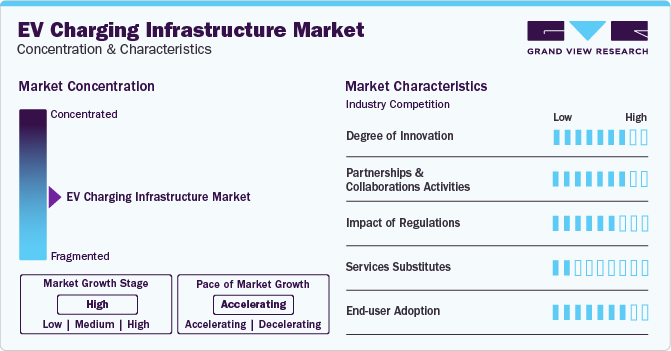Electric Vehicle Charging Infrastructure Industry Overview
The global Electric Vehicle Charging Infrastructure Market reached a valuation of $25.83 billion in 2023 and is forecast to expand at a compound annual growth rate (CAGR) of 25.4% from 2024 to 2030. Key drivers propelling the growth of this market include increasing global concerns regarding carbon emissions and the rising adoption of electric vehicles (EVs). Furthermore, governmental regulations and tax incentives are encouraging the uptake of EVs, consequently boosting the need for EV charging infrastructure solutions.

Moreover, rapid advancements in battery technology and the declining cost of lithium-ion batteries are anticipated to further contribute to market growth throughout the forecast period. The popularity of EVs has surged in recent years, primarily fueled by heightened environmental awareness and an emphasis on sustainability.
Detailed Segmentation:
- Charger Type Insights
Demand for slow chargers is expected to grow at a significant CAGR during the forecast period. Slow chargers are most commonly adopted by residential applications, which are used for overnight charging. Furthermore, most electric vehicle’s manufacturers such as BMW, General Motors, and Volkswagen Group offer slow chargers along with the purchase of electric vehicles, which is further fueling segment growth. For instance, General Motors offers a slow charger with the purchase of its electric car model.
- Connector Insights
CCS connector is expected to register the fastest CAGR during the forecast period, owing to increased preference by major automobile manufactures on the adoption of CCS connectors in their electric vehicles. For instance, in July 2019, Tesla announced the introduction of a CCS connector to support Model 3, with expected future compatibility with Model S and Model X in Europe.
- Level of Charging Insights
Level 3 charging is expected to register the fastest CAGR during the forecast period, owing to its fast-charging abilities. Level 3 chargers, the quickest charging option, have the capability to charge electric vehicles at a rate ranging from 3 to 20 miles per minute by using direct current. The voltage used by level 3 chargers is higher than level 1 and level 2, which is why is not seen installed at residential places as of now. However, as the number of EV users grows, companies and public spaces will implement such charging infrastructure, in order to fulfill the large demand. This in turn, is expected to drive the growth of the level 3 charging level segment during the forecast period.
- Connectivity Insights
The connected charging stations segment is expected to register the fastest CAGR during the forecast period. Connected charging solutions, also referred to as a network charger is a charging network, which is managed with network software systems. With connected charging solutions, electric vehicles are equipped with capabilities beneficial for drivers and hosts.
- Application Insights
The residential segment is anticipated to expand at a steady CAGR over the forecast period. The segment is further bifurcated into private houses and apartments/societies. Vehicle charger manufacturers are now focusing on the development of residential EV chargers to ensure higher availability and increased vehicle range. OEMs are partnering with charging network operators, EV manufacturers, utility service providers, and corporates to deploy fast-charging stations to increase their geographical presence and to enable cost-effective deployment of the EV charging network.
- Regional Insights
Europe is anticipated to witness significant growth in this market. Several European countries have set ambitious goals for reducing carbon emission and electric car stock commitments by 2020. For instance, in July 2018, the U.K. government passed the Automated and Electric Vehicles (AEV) Act. It provides the government with new powers to ensure rapid development of EVCI on motorways and fuel stations. Other European countries, such as France, the U.K, Germany, and Belgium, are also focusing on developing electric vehicle charging and support infrastructure to enable interoperability across different EVs throughout the region, thereby contributing to the growth of the Europe EV charging infrastructure market.
Gather more insights about the market drivers, restraints, and growth of the Electric Vehicle Charging Infrastructure Market
Key Companies & Market Share Insights
Some key players operating in this market include ChargePoint, Inc., Tesla. Inc., ABB Ltd., and bp pulse.
- ChargePoint, Inc. has delivered over 87 million charging sessions to date and has a customer base of over 4,000 commercial and fleet clients. The company has been undertaking various strategic initiatives to expand its presence in Europe. The company’s acquisition of General Electric’s EV charging network business is expected to add around 8,000 residential and 1,800 commercial charging points to its existing network.
- ABB Ltd. is leading the charge in product development and business expansion initiatives. The company is expanding its U.S. manufacturing operations to better serve its customers and help advance the adoption of electric vehicles from private vehicles to transit fleets and buses.
Key Electric Vehicle Charging Infrastructure Companies:
The following are the leading companies in the Electric Vehicle Charging Infrastructure market. These companies collectively hold the largest market share and dictate industry trends.
- ABB Ltd.
- ChargePoint, Inc.
- Leviton Manufacturing Co., Inc.
- Blink Charging Co.
- Tesla Inc.
- Webasto Group
- bp pulse
- Eaton Corporation plc
- Schneider Electric, Inc.
- Siemens
- BTC Power
- Delta Electronics, Inc.
- Tritium DCFC Limited
Order a free sample PDF of the Market Intelligence Study, published by Grand View Research.
Recent Developments
- In April 2023, ABB Ltd.’s ABB E-mobility business signed a Memorandum of Understanding (MoU) with PLN Icon Plus, a subsidiary of PT PLN Persero, to facilitate a partnership for developing the EV charging infrastructure in Indonesia
- In February 2023, ChargePoint Holdings, Inc. and Fisker, Inc., an automobile company, announced an agreement to improve the driving experience of Fisker Ocean drivers. The partnership aims to ensure that Fisker Ocean drivers can access charging facilities conveniently and seamlessly

No comments:
Post a Comment